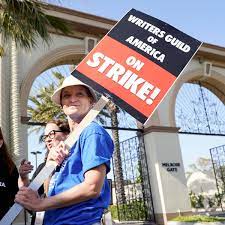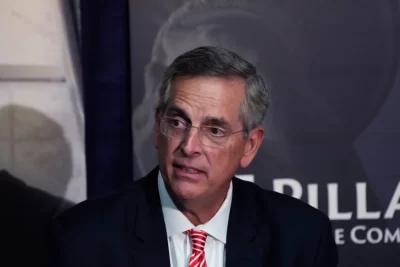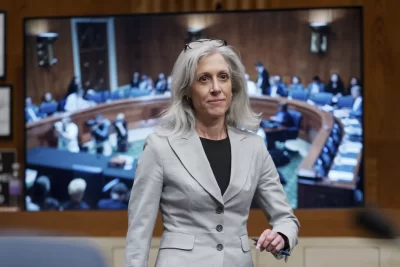
Negotiations between striking screenwriters and Hollywood studios are set to resume Wednesday, the latest attempt to bring an end to pickets that have brought film and television productions to a halt.
The two sides have been divided on issues of pay, the size of writing staffs on shows and the use of artificial intelligence in how scripts are created. Actors, who joined the writers on strike in July, have their own issues but there have been no discussions about resuming negotiations with their union yet.
The key players in the two strikes that have brought Hollywood to a halt include little-known leaders, labor lawyers, entertainment tycoons and the actor who played “The Nanny.”
Here’s a look at the figures who brought on the walk-off of actors and screenwriters, and who have the power to send them back to work:
CAROL LOMBARDINI
Her name is little known outside the industry, and she nearly never speaks to the media, but as head of the opposition in both the writers and actors strikes, Carol Lombardini is arguably the most important single figure in Hollywood’s labor stoppage.
Since 2009, Lombardini, a lawyer has been president and chief negotiator of the Alliance of Motion Picture and Television Producers, the conglomeration of studios, streaming services and production companies that creates contracts with unions.
She grew up in a working class suburb of Boston, got a degree in Renaissance history from the University of Chicago, and earned a law degree from Stanford. She worked for a pair of private firms before joining the AMPTP as an attorney when the group was first formed in 1982.
A respected if adversarial figure in years past, she has become the target of much of strikers’ vitriol. She appears often on picket signs and is the subject of many parody social media accounts.
ELLEN STUTZMAN
Ellen Stutzman was the one sitting across the table from Lombardini in the failed negotiations that led to the writers strike. It is not a seat she expected to occupy when the year began.
Stutzman, also an attorney, took over as chief negotiator for the Writers Guild on Feb. 28, just two weeks before contract talks began. She entered the role after longtime lead negotiator David Young, who led the guild through the 2007-2008 strike, stepped down for health reasons.
She still has the title from her previous role: assistant executive director for the Writers Guild of America West. Stutzman joined the union as a researcher in 2006. Researching the union’s issues and educating union members, government officials and the public on them are a specialty.
“We would tell the viewers and the public that writers are fighting to have a career, and to have a viable profession, and to continue to create the shows and movies that people in this country and around the world love,” Stutzman told The AP on the first day of the writers strike in May. “We hope that they’ll support them in that fight.”
Generally regarded as more low key and less combative than Young, Stutzman played a key role in writers’ 2019 fight with agents, in which WGA members fired their representatives en masse over plans by Hollywood’s major talent agencies to expand into production. The union also sued the agencies, calling the potential move a conflict of interest and a violation of antitrust law. That battle — which the writers won — in some ways served as a dress rehearsal for the current strike.
Stutzman graduated from the School of Industrial and Labor Relations at Cornell University in 2004 and worked for the Service Employees International Union-United Healthcare Workers before joining the Writers Guild.
THREE KEY CEOS
Lombardini and the AMPTP represent a coalition of more than 350 companies, but as in the entertainment industry itself, a few giants dominate. Three leaders have come to embody the group: Disney CEO Bob Iger, Warner Bros. Discovery chief executive David Zaslav and Netflix co-CEO Ted Sarandos.
As chief executive of entertainment’s biggest behemoth, Disney’s Bob Iger would always have been a target for strikers. But a new contract reportedly worth more than $30 million annually, the day before the actors strike was called, and his comments the following day, made him the first name on the lips and signs of many strikers. Iger said that it was “the worst time in the world” to add to the disruptions the industry’s already facing.






